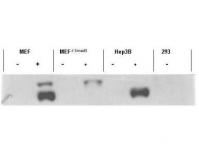SMAD3 Rabbit Polyclonal Antibody
USD 200.00
USD 867.00
USD 436.00
Specifications
| Product Data | |
| Applications | IHC, WB |
| Recommended Dilution | ELISA: 1:75,000 - 1:300,000, WB: 1:2,000 - 1:20,000, IHC: 1:500 |
| Reactivities | Human, Zebrafish, Rat, Mouse, Bovine, Xenopus, X. tropicalis, Chicken, Pig |
| Host | Rabbit |
| Isotype | IgG |
| Clonality | Polyclonal |
| Immunogen | This affinity purified antibody was prepared from whole rabbit serum produced by repeated immunizations with a synthetic peptide corresponding to amino acids 417-425 of human SMAD3 protein. |
| Formulation | 0.02 M Potassium Phosphate, 0.15 M Sodium Chloride, pH 7.2 |
| Conjugation | Unconjugated |
| Storage | Store at -20°C as received. |
| Stability | Stable for 12 months from date of receipt. |
| Gene Name | SMAD family member 3 |
| Database Link | |
| Synonyms | HSPC193; HsT17436; JV15-2; LDS1C; LDS3; MADH3 |
| Note | This antibody is suitable for Cancer, Immunology and Nuclear Signaling research. Smad3 (also known as Mothers against decapentaplegic homolog 3 Mothers against DPP homolog 3, Mad3, hMAD-3, JV15-2 or hSMAD3) is a transcriptional modulator activated by TGF-beta (transforming growth factor) and activin type 1 receptor kinase. These activators exert diverse effects on a wide array of cellular processes. The Smad proteins mediate much of the signaling responses induced by the TGF-b superfamily. Briefly, activated type I receptor phosphorylates receptor-activated Smads (R-Smads) at their c-terminal two extreme serines in the SSXS motif, e.g. Smad2 and Smad3 proteins in the TGF-b pathway, or Smad1, Smad5 or Smad8 in the BMP pathway. Then the phosphorylated R-Smad translocated into nucleus, where they regulate transcription of target genes. Based on microarray and animal model experiments, Smad3 accounts for at least 80% of all TGF-b-mediated response. |
| Reference Data | |
| Protein Families | Cancer stem cells, Druggable Genome, Embryonic stem cells, ES Cell Differentiation/IPS, Stem cell relevant signaling - JAK/STAT signaling pathway, Stem cell relevant signaling - TGFb/BMP signaling pathway, Transcription Factors |
| Protein Pathways | Adherens junction, Cell cycle, Chronic myeloid leukemia, Colorectal cancer, Pancreatic cancer, Pathways in cancer, TGF-beta signaling pathway, Wnt signaling pathway |
Documents
| Product Manuals |
| FAQs |
| SDS |
{0} Product Review(s)
Be the first one to submit a review






























































































































































































































































 Germany
Germany
 Japan
Japan
 United Kingdom
United Kingdom
 China
China




